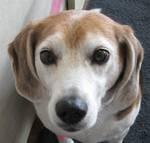
Senior pets are some of our most special patients. We’ve seen them through the chaotic puppy and kitten stage and had many years to develop a strong relationship with them and now they are more willing to calmly spend time relaxing with us. We recommend a physical exam every six months for senior pets.
Here are some medical differences between an adult and a senior pet:
- Decreased ability to digest protein and decreased metabolic rate
- Behavior changes due to brain aging
- Declining hearing, vision and sense of smell
- Skin and coat changes
- Increased risk of heart and lung disease
- Progression of tooth and gum disease
- Increased risk for hormone disorders
- Decreased muscle mass and degeneration of cartilage
- Declining kidney function
- Intolerance to extreme heat/cold
We recommend feeding senior pets a high-quality food that is very easy to digest and contains anti-oxidants, omega fatty acids and an appropriate amount of protein and calories. Joint health supplements, soft padded bedding and neutral temperatures are also recommended. Deterioration of body systems may be painful and many geriatric pets benefit from pain medication. Routine blood work can trend organ function and determine if therapy for chronic kidney disease, hypothyroidism (in dogs), hyperthyroidism (in cats), diabetes or other diseases should be implemented. Routinely having masses assessed may catch cancer early and allow it to be cured.
Just because your pet is old, it doesn’t mean that it should be slow or stiff, smell bad or be non-interactive and painful. Do not accept diseases in your pet simply because it is a senior. Unlike in people, your pet may not show you symptoms that you would associate with illness. At Coventry Animal Hospital, we aim for early detection of disease in pets that may outwardly appear healthy. Our goal is to prevent or delay disease and death where possible. We also assess your senior pet’s current quality of life to determine whether measures can be taken to improve its daily comfort.
Talk to one of our team members at Coventry Animal Hospital to discuss your senior pet’s individual needs.
Other Recommended Reading:
Cognitive Dysfunction in Senior Pets
Feeding Mature and Senior Dogs
Feeding Mature, Senior and Geriatric Cats
Benefits of Adopting a Senior Pet
